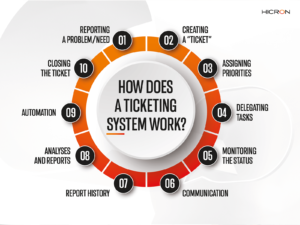You can spend hours browsing the solutions available on the market with no guarantee of finding the ideal match. At Hicron, however, we use one that perfectly integrates with our Clients’ systems, thus relieving them of the burden of searching on their own and demonstrating tools tailored to their individual needs. For years, we have been working with teams on the clients’ side based on Atlassian solutions, among others. Learn about the functionalities of ticketing systems designed with JIRA tools.
Ticketing system – what is it?
A ticketing system is used to handle Customer and employee requests that originate from many different communication sources and/or applications or software. It integrates several different environments and sorts them into specific categories. It also allows for the appropriate segregation of requests according to their priorities. Each request entered into the system is assigned an appropriate “ticket”, i.e. a tag that helps to identify the request. One request is one ticket. Each ticket contains information about the request, including a description of the problem, the sender’s contact information, status, and priority. The goal is to improve technology support processes, respond more quickly to Customer needs, shorten the complaint process, and – most importantly – organize the processes involved in managing user requests.
Ticketing system for companies – whose needs does it meet?
Any area of business can benefit from using a ticketing system. This solution perfectly meets the needs of HR departments, allowing employees to submit holiday or business trip requests using a “ticket”, all kinds of support platforms, which a gain space to inform about necessary repairs, or accounting departments, transferring documents between relevant structures for approval. These are just a few examples, as modern ticketing systems, properly integrated with a technological infrastructure, offer support in the workflow of various business processes and areas. Development teams can also benefit from their support. IT ticketing systems are currently one of the most important working tools in this industry, and their functionalities have a huge impact on the dynamic development of technology companies.
There is no doubt that this type of technology is becoming more and more popular. The number of instant messengers through which users report problems and needs related to systems or activities of specific companies is growing. Enterprises are also equipped with numerous devices and applications that require regular maintenance and systematization of the information flowing between their structures. Therefore, many organizations are faced with the need to equip their infrastructure with a ticketing system. Modern enterprises are looking for efficient and functional solutions that help them integrate requests from many sources into one convenient and responsive environment.

How does a ticketing system work?
A ticket management system is based on a centralized and integrated platform that users or Customers use to communicate needs and issues, track work progress, and complete and close orders. This technology enables effective ticket management, giving organizations the ability to effectively respond to customer needs as well as monitor and improve service quality.
A ticketing system works in the following order:
- Reporting a problem/need – users report a problem/need via the ticketing system.
- Creating a “ticket” – the system automatically generates a “ticket” and assigns it a unique identifier.
- Assigning priorities – users authorized to administer “tickets” assign a priority to each ticket, which defines how urgent a particular request is.
- Delegating tasks – the request is assigned to appropriate users or entire teams to work on its resolution.
- Monitoring the status – users who create a “ticket” and are responsible for its resolution can track the progress of activities performed on it; the assigned statuses are, for example: “new”, “under review”, “in progress”, “closed”.
- Communication – users who report and handle “tickets” can communicate and update each other on the progress of the work, or ask for details about ongoing activities.
- Report history – each “ticket” has a history in the system that includes communication, status changes, and a list of users involved in its management.
- Analyses and reports – ticketing tools allow one to conduct analyses and generate reports on employee efficiency, time spent on a particular request, or factors affecting request completion.
- Automation – advanced and modern ticketing systems offer the ability to automate certain stages of work on tickets, activities, or processes.
- Closing the ticket – when work on a “ticket” is completed, the user who created the request or a support service employee closes it, but the information about the ticket is still stored in the system and can be accessed by authorized persons.

Simple, ticket-based request management system – build it with Atlassian!
With so many solutions on the market that provide ticketing systems or tools for designing them, it can be difficult to find the right one. Searching for a suitable and responsive system can take a lot of time. That is why it is worth choosing proven technologies that allow integration with solutions from other vendors. Atlassian specializes in providing its Clients with tools that improve the work of both small and large structures and cooperating teams. The vendor’s goal is to provide its users with access to a secure, ultra-modern, and versatile platform that allows them to achieve maximum comfort in performing everyday tasks. Atlassian systems are primarily focused on teams and their integration.
They guarantee enterprises access to solutions that will increase their efficiency by improving processes, communication and servicing of individual areas. The Australian manufacturer’s tools, properly implemented and tailored to the needs of the enterprise, ensure acceleration and improvement of the quality of cooperation between departments in companies. The products are dedicated not only to programming, operational and business teams, but also to human resources, production, training and financial management.
JIRA Service Management – design your system to handle service requests!
With JIRA Service Management (JSM), you can design and build a ticketing system based on Atlassian technologies, allowing you to manage services from all areas of your organization. It was developed to help unlock the potential of highly dynamic teams by:
- enabling each team to quickly deliver high-quality services,
- increasing work transparency,
- accelerating workflow between development, IT, and business teams.
It is a solution based on the JIRA system that allows you to deepen your service management processes in the area of managing service requests, incidents, problems, changes, knowledge, resources, and configurations. It offers its users the space to design a customized ticketing system that will respond to the needs of each of its users. Its intuitive interface also allows employees to maintain a high level of satisfaction and comfort when executing or initiating service requests.
Functionalities provided by JSM:
- management of customer service processes,
- ready-made ITIL process templates,
- built-in SLA functionality,
- creating a knowledge base after integration with Confluence,
- automation of repetitive tasks,
- monitoring of relevant indicators,
- transparent Customer portal,
- advanced reporting,
- management of incidents, problems, changes, configuration,
- request queuing,
- building registers of configuration items,
- service support, customer service, Customer service automation.

Why will Hicron be your dream partner?
Our teams have many years of experience in using the functionality of the Australian vendor’s systems. Since 2015, Atlassian tools have given us the space to work on advanced projects. We know and understand the structures of these solutions perfectly. We run and manage projects in JIRA Software and use a ticketing system built in JIRA Service Management to handle service requests from our Clients, including those whose businesses are based on SAP systems. Atlassian tools offer great capabilities for efficient integration with technologies from other brands.
As an Atlassian Solution Partner, we ensure that we work in accordance with the vendor’s best practices and strategies. The trust we have gained through many years of cooperation with the company is reflected in the great involvement of the Atlassian team of experts in Hicron, not only in implementation projects. We also maintain the high quality of the Australian brand’s systems implemented for our Clients, ensuring their regular maintenance and expansion of functionality.
Contact our Atlassian consultants to find out what we can do for your systems!





